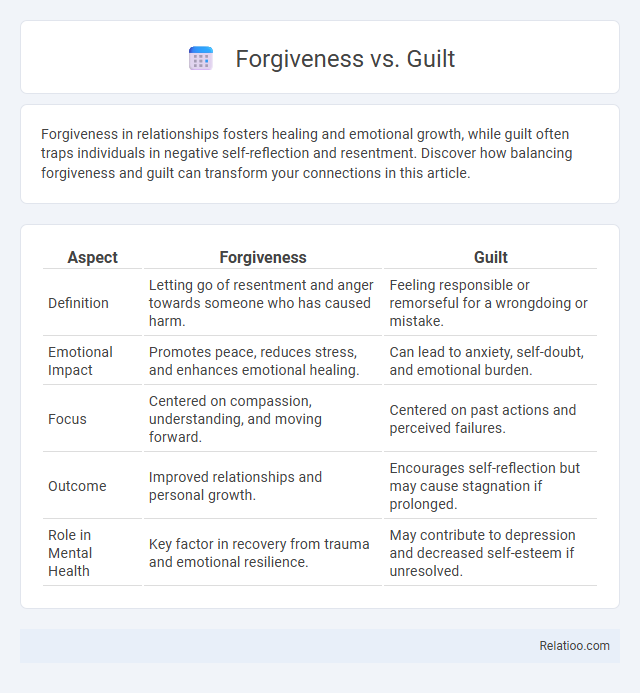Forgiveness in relationships fosters healing and emotional growth, while guilt often traps individuals in negative self-reflection and resentment. Discover how balancing forgiveness and guilt can transform your connections in this article.
Table of Comparison
| Aspect | Forgiveness | Guilt |
|---|---|---|
| Definition | Letting go of resentment and anger towards someone who has caused harm. | Feeling responsible or remorseful for a wrongdoing or mistake. |
| Emotional Impact | Promotes peace, reduces stress, and enhances emotional healing. | Can lead to anxiety, self-doubt, and emotional burden. |
| Focus | Centered on compassion, understanding, and moving forward. | Centered on past actions and perceived failures. |
| Outcome | Improved relationships and personal growth. | Encourages self-reflection but may cause stagnation if prolonged. |
| Role in Mental Health | Key factor in recovery from trauma and emotional resilience. | May contribute to depression and decreased self-esteem if unresolved. |
Understanding Forgiveness: A Brief Overview
Understanding forgiveness involves recognizing it as a conscious decision to release resentment and anger toward yourself or others, which can alleviate the burden of guilt and reduce anxiety. Forgiveness promotes emotional healing by shifting focus from negative emotions to acceptance and compassion, improving your mental well-being. Cultivating forgiveness transforms internal conflicts and fosters resilience, allowing you to move forward with greater peace and clarity.
The Psychology Behind Guilt
Guilt arises from an internal recognition of wrongdoing, activating brain areas like the prefrontal cortex responsible for self-reflection and moral judgment. This emotion often triggers anxiety by heightening self-critical thoughts and fear of consequences, creating a feedback loop that impedes emotional healing. Understanding the psychological mechanisms behind guilt can empower you to practice forgiveness, breaking free from debilitating anxiety and fostering mental resilience.
How Guilt Manifests in Our Lives
Guilt often manifests through persistent self-criticism, emotional discomfort, and avoidance behaviors, creating an internal barrier to self-forgiveness. It can lead to increased stress levels, social withdrawal, and impaired decision-making, negatively impacting mental health and relationships. Recognizing guilt's patterns enables individuals to address the root causes, reducing anxiety and fostering emotional healing.
The Healing Power of Forgiveness
Forgiveness plays a crucial role in alleviating guilt and anxiety by enabling emotional release and fostering inner peace. When You choose forgiveness, it interrupts the cycle of negative emotions that fuel mental distress, promoting psychological healing and resilience. Embracing forgiveness can transform Your emotional landscape, reducing stress and enhancing overall well-being.
Forgiveness vs Guilt: Key Differences
Forgiveness involves releasing resentment and embracing compassion towards oneself or others, while guilt arises from the recognition of having caused harm or wrongdoing. Forgiveness promotes emotional healing and personal growth, whereas guilt often triggers self-criticism and emotional distress. Understanding these differences is crucial for effective mental health strategies and fostering psychological resilience.
The Role of Empathy in Forgiving
Empathy plays a crucial role in the forgiveness process by enabling individuals to understand and share the feelings of those who have caused harm, thereby reducing feelings of guilt and anxiety. This emotional connection fosters compassion, which can alleviate the burden of negative emotions and promote healing. Neuroscientific studies reveal that empathic engagement activates brain regions associated with social bonding and emotional regulation, facilitating sincere forgiveness.
Overcoming Guilt: Practical Strategies
Overcoming guilt involves acknowledging your feelings and identifying the source without letting them dominate your mindset. Practicing self-compassion and reframing negative thoughts can reduce anxiety linked to past mistakes, fostering emotional healing. You can also benefit from mindfulness techniques and seeking support from trusted individuals or professionals to break the cycle of guilt and anxiety.
Can Forgiveness Erase Guilt?
Forgiveness plays a crucial role in alleviating guilt by fostering self-compassion and acceptance, which can diminish the emotional burden of past mistakes. Psychological studies indicate that genuine forgiveness facilitates cognitive reframing, helping individuals release persistent negative self-judgments tied to guilt. However, forgiveness alone may not completely erase guilt if underlying anxieties or unresolved issues remain unaddressed through further therapeutic intervention.
The Impact of Forgiveness on Mental Health
Forgiveness plays a crucial role in alleviating guilt and reducing anxiety, leading to improved mental health outcomes. Studies show that practicing forgiveness lowers stress hormone levels and promotes emotional resilience, helping you break free from the cycle of negative emotions. Embracing forgiveness can result in enhanced psychological well-being, better mood regulation, and stronger interpersonal relationships.
Cultivating Forgiveness: Steps Toward Emotional Freedom
Cultivating forgiveness involves acknowledging pain without harboring resentment, a vital step toward emotional freedom. Techniques such as mindful reflection, empathetic understanding, and self-compassion help reduce guilt and anxiety by reframing negative experiences. Embracing forgiveness promotes mental well-being, decreases stress hormone levels, and fosters healthier interpersonal relationships.

Infographic: Forgiveness vs Guilt
 relatioo.com
relatioo.com